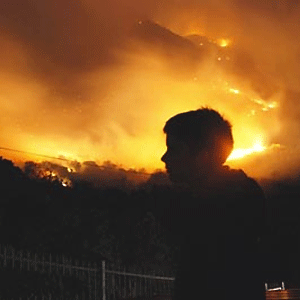
Philip Prins, Table Mountain National Park (TMNP) Fire Manager, says: “There’s a lot you can do as a homeowner to protect your property – much of it is straightforward. Each year houses are threatened or lost that might have been saved if residents had used a bit of common sense".
What to do before the fire approaches:
• Form a safety zone, ideally with a radius of 20m around your house, using paving, gravel or green lawn that is kept short and well-watered. Keep this area free of debris like dead leaves and twigs. No tree branches should overhang the safety zone. Avoid having trees and bushes adjacent to the house, or creepers on the walls.
• Keep roof surfaces and gutters free from flammable debris.
• Remove dead branches, which burn easily, from trees. To reduce the chance of fire spreading between trees or from the ground to trees, keep the space between tree crowns clear, and remove low-hanging branches or those that may come into contact with electrical wires (it’s best to get a professional tree service in to do this.)
• Choose fire-resistant, water-wise plants for your garden – especially those near your house. Remove alien species that tend to burn well e.g. eucalyptus. Southern Cape residents can contact the Table Mountain National Park (TMNP) visitor’s centre at Cape Point (021 780 9010) for advice.
• Consider installing screens, shutters or heavy fire-resistant curtains. During a fire, wind can blow embers and other burning debris onto your property, sometimes with enough force to break windows.
• Keep useful tools easily available to deal with small fires before the fire professionals arrive e.g. a rake, axe, saw, spade, fire beaters. Have a ladder that will reach the roof: you may need to get up there to wet it down or remove flammable or burning debris.
• Store any combustible substances e.g. firewood, gas, petrol, paint and solvents as far away from the living area as possible, and only keep the minimum that you need on your property.
• Make sure your hoses are in good working order, and can reach all parts of the property.
• Swimming pools and other water features like ponds can be a useful source of water during a fire.
• During fire season, check the fire danger rating on a daily basis.
• Enter emergency numbers on your cell phone and paste them up next to landlines.
• Keep an eye on electricity installations, like pylons, on or near your property, and report to municipal authorities if these are not well maintained.
When to do when the fire is heading your way:
• Hose down the garden and house, especially on the side of the approaching fire.
• Fill baths and other containers with water for use in case the water pressure drops.
• Block gaps under doors with wet towels.
• Close doors, windows and window screens.
• Follow instructions from emergency services as regards evacuation. If there is no official evacuation order, and you have decided to stay on your property, go indoors before the fire front arrives and stay there until it has passed.
• Remain vigilant even after the fire front has passed: watch for flareups and go online / listen to radio broadcasts for advice from the authorities.
To read live updates on the fires blazing in Cape Town, click this link on News24.
To evacuate or not to evacuate?
Prins says that it may not always be appropriate to evacuate when a wildfire approaches. “The thinking is that more houses could be saved if homeowners were prepared, acted quickly and didn’t just leave everything up to the emergency services. This depends of course on the specific circumstances – in some cases, vulnerable individuals like children should be moved if fire threatens.”
Homeowners should also follow any evacuation instructions from official emergency services.
If homeowners are planning to stand their ground and help protect their turf, however, Prins says they need to be properly prepared, preferably with basic fire suppression training and equipment.
Get involved, get organised and spread the word
If your property is sufficiently large (e.g. a smallholding) and at risk (e.g. adjacent to a national park or other vegetated area), it is advisable to join, or form, a Fire Protection Association (FPA).
A major incentive for this is that FPA membership affords members protection from legal liability should a wildfire start on their property. According to the "presumption of negligence" clause of the National Veld and Forest Act, a landowner can be found liable to cover the costs of fire suppression operations - which can easily run to hundreds of thousands of rand - should a wildfire start on his or her property.
To find out more about FPAs in your area, call 011 397 1618/9. If you are resident in the Cape Peninsula, contact Philip Prins regarding FPAs on 021 689 7438/9.
For fire suppression training or equipment, contact Enviro Wildfire Services (Rob Erasmus) on 083 411 3378.
Follow Twitter for updates on the fire situation near you
Regularly check in with the South African Weather Service Fire Index map
![[Animation]](http://www.weathersa.co.za//media/data/data/fpgwarnings/FDI_Today.png)
Read more:
Can you outrun a wildfire?
Fire and firefighters - pictures
Sleep disorders common among fire fighters
Fire tips sourced from TMNP, DWAF, Red Cross and FEMA, Health24




 Publications
Publications
 Partners
Partners









